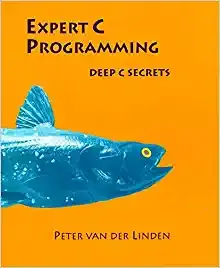15 Best Books to Learn C Programming in 2024
15 Best Books to Learn C Programming in 2024
1. Pointers on C
"Pointers on C"-Don't be fooled by the title of the book. This book seems to specifically talk about pointers, but it is actually a more complete description of the language and operating environment of the C language.
2. C Traps and Pitfalls
3. C Primer Plus
4. The C Book
- Introduction to Variables and Algorithms-Introduces the basic knowledge of C language, including keywords and identifiers, variable declarations, real number types, integer types, expressions and algorithms, and constants
- The control flow and logical expressions chapter introduces several methods that can be used to control program flow in the C language, including some statements that have not yet been introduced. Control flow, logical expressions, and strange operators.
- Function-function type, recursion, parameter passing, and linking
- Arrays and pointers-arrays, pointers, character processing, size and storage space allocation, function pointers, expressions containing pointers, arrays, & operator and function declarations
- Structure data types-structures, unions, bit fields, enumerated types, qualifiers, derived types, and initialization
- Preprocessor-how the preprocessor works and its related instructions
- Some specific content in C language-declaration, definition, typedef, const and volatile, and sequence points
- Libraries-diagnostics, character processing, localization, implementation-related restrictions, mathematical functions, non-local jumps, signal processing, variable parameters, input and output, formatted I/O, character I/O, unformatted I/ O, random access function, general function, string processing, date and time
- A complete program is written in C language-combining the above content, main function parameters, parsing program parameters, pattern matching program, and a more difficult program
5. C Elements of Style
6. Build Your Own Lisp
7. The GNU C Programming Tutorial
8. Essential C
- Introduction
- Basic types and operators
- Control structure
- Complex data type
- function
- Miscellaneous
- Advanced arrays and pointers
- Operators and standard library
9. Beej's Guide to Network Programming
- Building the basic building blocks of the program
- Variables, expressions, and statements. A variable is the name of a number-a C language expression that can contain other expressions and operators. The article also introduces if, while, do-while, and for statements that are repeatedly executed by the program.
- Function-When the program blocks become very large, or when these program blocks are used to perform some specific work, we will encapsulate them in functions.
- Variables (continued)-discusses the scope and storage types of variables
- Pointers-They is the addresses of data in memory. Just like the value of an integer can be 12, the value of a pointer is the address of the data in memory
- Structure-Structure allows you to group logically related variables. You can use it as a whole later.
- Array-a linear collection of related data
- String-A string in C language is a group of consecutive bits in memory, containing a group of characters
- Dynamic memory-discussed malloc(), free(), realloc() and calloc() functions
- More content-pointer arithmetic, typedef, enumeration, structure declaration, command line parameters, multidimensional arrays, type conversion, type promotion, incomplete types, void pointers, NULL pointers, and static keywords
- Standard input and output library used to read and write files.
- String operations-functions for finding substrings functions for concatenating strings, functions for obtaining string length, etc.
- Arithmetic-some functions that can meet your basic arithmetic needs.
10. Modern C
- The first layer-to make readers understand the most basic C language program. Understand the purpose and data structure of using C language, and how to use them
- The second layer detailed description of most of the main concepts and features, including control structures, data type operators, and functions. The main purpose of this level is to allow readers to have a deeper understanding of the knowledge necessary for these operating procedures.
- The third layer is the core part of the C language. The pointer is explained in detail, so that you are familiar with the memory model of the C language, and lets you understand the interface of most C language libraries
- The fourth is an in-depth understanding of some specific topics. Such as performance, reentrancy, atomicity, threading, and generic programming
- The fifth layer explores the author's understanding of the future development trend of this language
11. An Introduction to GCC
- Compile C program-describes how to use GCC to compile C language programs. A single file or multiple files can be compiled, and operating system functions and header files can also be used.
- Compilation options introduce some commonly used compilation options in GCC. These parameters control some functions, such as searching the path of library functions and header files, and provide additional compilation warnings and diagnostics. Preprocess macros and C language dialects.
- Use preprocessor-describes the use of CPP (GNU C preprocessor), CPP is part of GCC. The preprocessor will expand the macros in the code before compilation. When GCC processes c or c+ code, the preprocessor will be called automatically.
- Compile the program with debugging information a-g option is provided to store additional debugging information in the intermediate file and executable file. This debugging information allows us to track down errors and locate problems in machine instructions to the source code.
- Optimized compilation-GCC is an optimized compiler. It provides many options to speed up the compilation or reduce the size of the compiled file.
- Compiling C++ Programs-describes how to use GCC to compile C++ programs and the command-line options that can be used in the language.
- Platform-related options-introduces the options available for some common platforms
- Troubleshooting-GCC provides some help and diagnostic options to help us locate problems during the compilation process.
- Compiler-related related Introduces some useful tools that will be used in the GCC compilation process. The GNU archiving tool is used to create the library, GNU performance, and coverage test programs gprof and gcov
- How the Compiler Works-Describes in detail how GCC compiles source files into executable files. The compilation is a multi-stage process involving many tools, including the GNU compiler itself, the GNU assembler, and the GNU linker. The various tools used in the compilation process are collectively referred to as the compilation chain.
- Check the compiled file-introduces some tools used to check the contents of executable files and obj files.
- Common error messages are the most common error and warning messages generated by GCC and G++. Each situation comes with cause analysis, examples, and suggested solutions.
- To help the reader encounter a problem that is not mentioned in the book, there are many manuals that introduce GCC and languages for reference.
12. C Programming Language
13. Expert C Programming
14. C: A Reference Manual
15. C Interfaces and Implementations
C Interfaces and Implementations: Techniques for Creating Reusable Software
Programmers can learn the C program in 4 ways
1. Brush questions
2. Type the code again
3. Project exercises
4. Look at classic C language programming books
Book Recommender
LOOKING FOR MORE BOOKS TO READ?
Explore and find your next good read - Book Recommender for specific interests.
Discover ratings, reviews, summaries, and genres from Google Books.
Get Book Suggestions




















